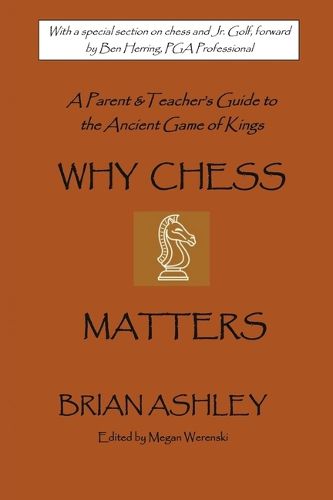Readings Newsletter
Become a Readings Member to make your shopping experience even easier.
Sign in or sign up for free!
You’re not far away from qualifying for FREE standard shipping within Australia
You’ve qualified for FREE standard shipping within Australia
The cart is loading…






Chess can have a profound effect on the educational experience of our students by introducing new skills, called "non-cognitive skills," not ordinarily found in a typical curriculum, which relies heavily on memorizing and regurgitating facts. Non-cognitive skills include grit, determination, patience, self-confidence, problem solving and a host of other qualities that help kids succeed. Why Chess Matters explains how and why chess can help in non-cognitive skills.
Significantly, these same qualities and skills form the foundation of the relatively new field of Positive Psychology, founded by Dr. Martin Seligman in the late 1990's. For example, just one of these qualities is patience. For a parent watching their former fidgety kid sitting still, concentrating on winning a chess game, over a board and opposite a real human, and not a computer or TV screen, is nothing short of miraculous! The book explores other qualities too.
To sum up, the teaching and learning experience, using the elements found in Why Chess Matters, is the best way to introduce people to the ancient game, and infuse skills and qualities not prevalent in other forms of teaching.
$9.00 standard shipping within Australia
FREE standard shipping within Australia for orders over $100.00
Express & International shipping calculated at checkout
Chess can have a profound effect on the educational experience of our students by introducing new skills, called "non-cognitive skills," not ordinarily found in a typical curriculum, which relies heavily on memorizing and regurgitating facts. Non-cognitive skills include grit, determination, patience, self-confidence, problem solving and a host of other qualities that help kids succeed. Why Chess Matters explains how and why chess can help in non-cognitive skills.
Significantly, these same qualities and skills form the foundation of the relatively new field of Positive Psychology, founded by Dr. Martin Seligman in the late 1990's. For example, just one of these qualities is patience. For a parent watching their former fidgety kid sitting still, concentrating on winning a chess game, over a board and opposite a real human, and not a computer or TV screen, is nothing short of miraculous! The book explores other qualities too.
To sum up, the teaching and learning experience, using the elements found in Why Chess Matters, is the best way to introduce people to the ancient game, and infuse skills and qualities not prevalent in other forms of teaching.